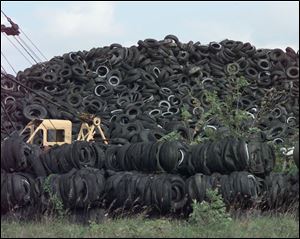
Kirby Tire contempt testimony finishes
5/4/2001
Rebecca Williams, her husband, Donald, and her mother, Doris Kirby, have been ordered to clean up more than 20 million tires from the storage site along State Rt. 231 in Sycamore.
UPPER SANDUSKY - A judge ordered attorneys for both sides in a contempt-of-court case against Kirby Tire Recycling to submit proposed findings to her within 30 days as testimony ended yesterday in Wyandot County Common Pleas Court.
Judge Kathleen Aubry said she will review the findings, plus three days of testimony and exhibits, then decide whether the tire dump and its operators violated court orders to clean up more than 20 million tires, disclose financial and business records, and take other actions.
The Ohio attorney general's office filed contempt-of-court charges against Kirby Tire and its operators on Feb. 15, and state attorneys this week accused the company's owners of liquidating assets and hiding money to avoid paying for a cleanup at the site.
The state alleges that Rebecca Williams, her husband, Donald, and her mother, Doris Kirby, ignored court orders to control mosquitoes at the dump, limit the size of tire piles, and refrain from spending or selling assets unless required for site cleanup.
In testimony Wednesday, the Williamses said a September, 1998, court order to stop accepting tires cut off their business's sole revenue source, preventing them from cleaning up the dump.
The defense rested yesterday after the end of testimony from Mrs. Williams, a former bookkeeper for the family-owned tire storage site along State Rt. 231 in Sycamore.
Under cross-examination by Melissa Yost, an assistant attorney general, Mrs. Williams acknowledged that she, her husband, Donald, and her mother, Doris Kirby, continued to draw salaries after an August, 1999, fire burned 5 million tires.
The statement contradicted testimony Mrs. Williams gave Wednesday, when she told the court that she, her husband, and mother stopped receiving company paychecks when the facility caught fire Aug. 21, 1999.
Mrs. Williams acknowledged that she, her husband, and mother each received three payroll checks between Sept. 24, 1999, and Oct. 1, 1999. In addition, she testified that she continued to be paid by the company through Jan. 7, 2000.
In his closing arguments, assistant attorney general Michael Idzkowski said the defendants offered “self-serving statements” instead of proof for their claims of financial trouble. He said the company's owners failed to provide corporate tax returns, financial statements, and other documents requested by the state. But check stubs, deposit records, and other limited data offered by the defendants proved their attempt to evade responsibility for the cleanup, Mr. Idzkowski said.
“Their own information they provided us says they liquidated their assets,” he said. “And why does a company like Kirby's Tire liquidate its assets? Because the state is out there. Because 15 million tires are out there.”
Mr. Idzkowksi pointed to testimony from Mrs. Williams about the sale in June, 1999, of a company-owned car wash for $158,000.
Mrs. Williams said on Wednesday that she deposited some of the proceeds from that sale into an account at First National Bank of Sycamore and obtained a cashier's check for the rest - a practice that Mr. Idzkowski said allowed her to conceal funds that should have gone toward tire removal.
“She's obviously a very clever woman,” Mr. Idzkowski said. “She's doing it to hide the money.”
The assistant attorney general said the state was stuck paying to remove tires from the site, bankrupting the Ohio Environmental Agency scrap tire fund and preventing cleanup work at more than 70 smaller tire dumps.
EPA spent just over $5 million between May, 1999, and September, 2000, to remove 2.8 million tires from the site and clean up wastewater. It spent the tire fund's entire $2.3 million budget for fiscal 2000.
“What the state wants is for the Kirbys to pay their fair share,” Mr. Idzkowski said, addressing Judge Aubry. “What is the defendants' fair share, your honor? Anything and everything they can do.”
In his closing statement, defense attorney Mark Segreti, Jr., argued that the court-ordered cleanup was unrealistic and superseded by EPA's decision to hire a contractor to clean up the site.
In particular, Mr. Segreti said the court's September, 1998, order against accepting tires at the Kirby site “asks my clients to do the impossible.”
“It effectively closed the operation,” he said. “It cut off all their income.”
Mr. Segreti said six days after the court's order, which called for the company to remove 100,000 pounds of tires a day, the EPA ordered the company to clean up all the tires within 120 days. “Accomplishing it in 120 days was just as reasonable and feasible as the court's original order, which said, `You must remove 100,000 pounds of tires a day, and by the way, you don't have any money to do it,'” he said.